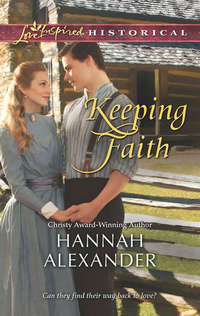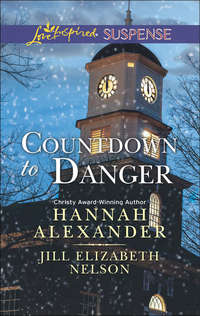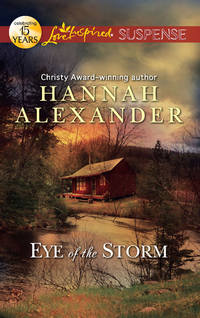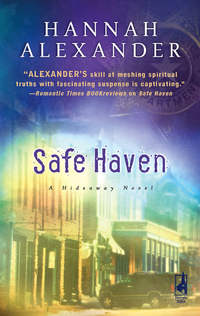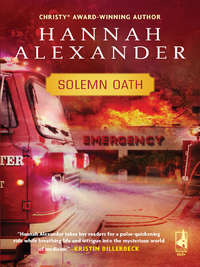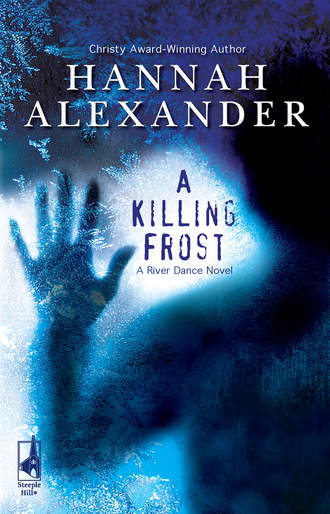
Полная версия
A Killing Frost
She reached toward the open window. A hand grabbed her leg and jerked her back.
“You killed us!” Deb screamed. “We’re gonna die!”
Something shoved Doriann’s bottom upward. She didn’t look to see what it was. She grabbed at the edges of the window and tugged herself toward it, kicking at the hand on her leg. The grip relaxed as Doriann squeezed her shoulders through the opening. Freezing water splashed her face, shocking her as it poured into the cab.
With all her might, she dragged her way out of the tangle of arms, plunging face-first into the pickup bed. It was filled with cold water, weeds and rotten, floating logs. The swamp probably was filled with snakes and leeches and the bodies of other people who’d crashed and drowned in the slimy pit. She kicked hard against the cab and swam through the gunk toward the weedy bank.
She heard Deb’s and Clancy’s angry screeches as her feet sank into the mud. She fought her way through the undergrowth beneath the trees. The splintering tinkle of breaking glass reached her as the voices grew louder, as water splashed.
Doriann crashed through the reeds and cane as fast as she could, and she didn’t look back.
Chapter Seven
D oriann had no idea where she was, or where she was going, but the road had to be just ahead. Briars and branches caught at her hair and her soaked jacket, and the mud that filled her shoes squished with every step. She pushed her way through the briars, ignoring the pain. She’d worry about the blood later. She couldn’t think about that now.
In fact, if she was bloody when she reached the road, someone would stop for sure. Who wouldn’t pull over for a bloody, lost little girl?
Okay, maybe not a little girl, but she sure was lost, and if she kept getting caught in blackberry brambles, she’d be as bloody as a victim in one of the horror movies Mom and Dad never let her watch. Now if only a car would pass on that lonely road…if she could find the stupid road.
She stumbled, looked down and glimpsed a tire rut in the ground. Must be going the right way if that was from the truck. They’d hit the ground hard a couple of times. She plunged through another thicket of trees at the top of the hill. The road was here, it had to be right here….
The ground sank beneath her. She fell on her bottom in soft mud, saw the broad, silvery sparkle of the Missouri River spread out in front of her, flowing in the morning sunshine. She gasped.
It wasn’t the road! She’d been running in the wrong direction! The ground sank farther, and she scrambled backward to keep from plunging into the water.
She looked up to see sunbeams streaking through the tree limbs to her left. So that was east. There were no straight lines in the woods, and that crazy river went every which way.
Aunt Renee said when you got lost in the woods without a fancy GPS device, then you had to look for the sun. If it was cloudy, you had to follow the water. It was the only way to find civilization again. Water followed the path of least resistance, and creeks drained into rivers, and there were people at the rivers, especially the Missouri.
Doriann glanced back the way she had come, and heard the rustle of brush, a voice, swearing and yelling.
She was trapped! She looked down where loose, muddy dirt had sunk beneath her feet. She couldn’t jump into the river; though she was a good swimmer, it was too cold. Aunt Renee said Grandpa was worried about a killing frost harming the vineyard this year. Tonight was supposed to be the killer. It had been a warm spring, but the past two days had been cold. It was a bad combination.
The rustling noises grew louder, the angry voices sharper. She rolled to her side to duck behind a bush. At least the warm spring had produced early buds and leaves for cover.
Unfortunately, the pale green buds and brambles stuck to her clothing, and every time she moved, the whole bush quivered.
She tugged off her bright purple jacket, dropped it onto the ground, then rolled onto it. Maybe her light green T-shirt and blue jeans—now covered with mud—wouldn’t show up too much…and maybe her red hair would blend with…what? The sky? The river? Nothing!
Okay, but her hair was drenched, so it was darker, and might not be so obvious.
Clancy and Deb were getting closer. They would see her for sure. She was toast.
Think, Doriann, think!
Okay, what did people do to hide? They climbed trees. But Clancy and Deb were already too close; she’d be seen if she tried to go up a tree trunk.
She glanced along the riverbank again. Where had she seen someone hiding…Yes! In Lord of the Rings, in the first movie, the hobbits hid beneath the bank’s ledge when the ring wraith was looking for them. There were roots…
She studied the bank in both directions, searching for a tree teetering at the very edge…
Nothing. And there was no one on the river this morning who would hear her call for help. Even if there was, she couldn’t call loudly enough to get anybody’s attention without giving herself away to the killers. Besides, what if they killed whoever tried to rescue her?
She was toast.
Jama drove the familiar main thoroughfare of her hometown, looking for a light blue Honda Civic. She could probably call Kaiser’s grocery store and ask if Fran Mercer was there, but Jama wanted to deliver the news about Monty herself.
Several kindhearted women in River Dance had undertaken the responsibility of mothering Jama after her own troubled mother had left. Tilly Kaiser, who ran Kaiser’s Grocery with her husband, Harold, had watched every Saturday morning when Jama did the weekly shopping, ensuring that the young girl chose nutritious food—fruits and vegetables, lean meats, whole grains, milk. Tilly allowed the occasional candy bar or small carton of ice cream, but no sugary breakfast cereals. Tilly could claim credit, during Jama’s early adolescence, for neither Jama nor her dad developing cavities.
Ellen Schiska, who owned the Second in Time clothing and shoe store, always set aside the nicest—and most modest—recycled apparel in Jama’s size. By selecting clothing that had come from sources out of town, Ellen protected Jama from ridicule by school peers.
Thanks to these women, few of Jama’s classmates realized the struggle Dad had supporting the two of them after Mom left. Few knew the debt Mom incurred for Dad in her state of mind. Dad never spoke to anyone about the night job he held in Fulton as the elementary-school janitor. To everyone in River Dance, Richard Keith ran the local farm implement sales and repair, and managed a thriving business.
And then there was Zelda Benedict. She had a full-time job, a louse for a husband and the responsibility of raising her two willful grandchildren after her daughter’s death from a drug overdose, but Zelda had found time to notice Jama often enough at the nursing home to teach her about patient care. It was partly due to Zelda’s professional recommendation that Jama was accepted into med school.
Despite the kindness of the women in Jama’s youth, it was Fran Mercer who held a mother’s place in Jama’s heart.
One day during Jama’s sophomore year in high school, Monty and Fran Mercer had pulled Jama out of her chemistry class. They walked with her to the counselor’s office and sat with her while she was given the news that her father had been killed in an accident, delivering a tractor to a customer.
Fran had held Jama while she cried, and together, Monty and Fran assured Jama she would never be alone. They took her into their home when she was fifteen, and she became a part of the family.
Jama could never hope to repay Fran’s motherly kindness. She’d loved Jama the most when Jama was the least lovable, the most angry over life’s losses, seething at a mother who’d abandoned her, and at a fate that had taken her father from her far too soon.
And so it was Fran for whom Jama would risk anything, including her job.
Jama found her moments after leaving the clinic. Community-minded, Fran preferred to do as much of her shopping in River Dance as she could.
When Jama drove into the parking lot of Kaiser’s, she immediately spotted Fran’s bright red hair, which had been inherited by three of her five grandchildren. Fran was carrying two bags of groceries toward her car. When she saw Jama, her face broke into a wide smile. She rushed to her car, placed the groceries inside and was waiting with arms open wide when Jama reached her.
“Sweetie, I was just thinking about you.” Fran smelled of the lavender soap she had used for years. The yarn of her pink sweater tickled Jama’s chin.
“Fran, I’ve got—”
“I know you must be on your way to work.” Fran checked her watch. “I bet you ran off without breakfast again, didn’t you? I was going to deliver some sausage quiches by the clinic, knowing your habits haven’t changed much over the years.” She patted Jama on the back. “Too bad I didn’t bring them with me to the store, but—”
“Fran.” Jama took her sixty-year-old foster mother’s hands. “I had my first patient at the clinic. It was Monty.”
Jama explained the situation, slightly surprised that Fran hadn’t already heard about her husband by way of the lively River Dance grapevine.
Fran’s fair skin paled visibly.
“You took care of him yourself?” Fran asked.
“I was the only one there or I’d have requested someone else—”
“Nonsense, I’m glad it was you. Sounds to me as if you made the right call, hon.”
“Harold Kaiser helped carry Monty into the clinic,” Jama told her. “Haven’t you seen him this morning? I’d thought he might tell you.”
“You know he hired that new manager. He and Tilly don’t come in until the afternoon now. I’ll just go see if the store will hold my groceries for me until I can collect them.”
“You can ride with me, and we’ll have Tilly take the groceries to your house when she’s off her shift. She still has a key to your house, doesn’t she?”
“Yes, but I never lock my doors, you know that. Honey, I can drive myself to the hospital. You have a new job, and a new boss who needs your—”
“My new boss doesn’t need me as much as my family does right now. I would be little help to her when I’m worried about Monty.”
Fran’s gentle gaze rested on Jama. “No reason to worry. He’s receiving excellent care, I’m sure. It’s in God’s hands.”
Jama carried the groceries back into the store, explained the situation to Anita, the cashier who had worked the register for twenty years, and returned to the parking lot. She opened the passenger door of her Outback for Fran and waited. Fran was not driving herself, and that was final.
Fran relented with grace—more likely for Jama’s sake than for her own.
“I don’t know how you do that,” Jama said as she pulled out of the parking lot and drove north toward Highway 94.
“Do what, hon?”
“Place everything in God’s hands and let Him handle it.”
Fran paused, staring out across a portion of the family vineyard to the left of the road. “Sounds like a simplistic Sunday-school answer, doesn’t it?”
Jama grimaced. That was exactly what she’d been thinking, and she was ashamed. She was a believer, but this bit about trusting her loved ones and her future to God…that was a hard lesson to master. She’d failed repeatedly at the faith walk that Fran made look so easy.
“Did you ever think it’s the Sunday-school answer because it’s the right one?” Fran asked. “Oh, wait a minute.” She fluttered her fingers over her mouth. “I forgot I’m talking to the original Missouri mule. Little Jama Keith always had to develop her own theory about everything from cooking a breakfast of fried potatoes, eggs and mountain oysters, to understanding God.”
Jama cast her foster mother a stiff grin. “Some things—”
“Never change. I know. But, honey, I trust in God’s power and in eternity. Otherwise, they’d have buried me with Amy.”
Jama turned left onto the highway and headed west, her hands a little tight on the steering wheel, a lump swelling in her throat. She swallowed and focused on the road.
They rode in silence for several miles, and Jama struggled to think of something besides Monty’s gray face, and her instinctive decision to withhold treatment for the most obvious symptoms.
“When I was a young mother,” Fran said, once they were a few miles from River Dance, “I used to worry about how my children would turn out as adults, what I was doing, the decisions I might make that could scar them for life.”
Jama glanced at her. “You were a great mom. Your kids always loved you.”
Fran nodded. “I never doubted that. I finally realized that the worry didn’t do anyone any good, and it took too much time—I was too busy raising my children, keeping house, helping Monty in the fields and vineyards to spend much time worrying. I still struggle with it occasionally. Who doesn’t? I mean, it seems the motherly thing to do, you know. To worry about your children. A loving gesture.”
Jama swerved to miss a dog, honked at it, glanced at it in the rearview mirror. “That looked like Monty’s hunting hound.”
“Probably is. He wanders away sometimes. Monty likes to hunt on Andy Griswold’s property, so Humphrey knows the area. There’s no leash law in River Dance. I suppose there should be, but you know Humphrey, he loves to wander.”
Jama cast Fran a quick look, saw that she was gazing at the Missouri River to the left. Her lips curved downward, her eyes seemed to have dulled in the past few minutes. For all the talk about not worrying, she appeared less than serene. And then she saw Jama’s expression.
“Okay, you caught me.”
“You doing okay?” Jama asked.
“I’ll be fine. How about you? It can’t be easy, making the kinds of decisions you have to make.”
“All that expensive training has its advantages. If I had worried about every patient I saw during residency, I’d have been no good to anyone.”
“But this is Monty,” Fran said gently.
“As I said, that’s where the training kicks in. I’ve seen enough cases like Monty’s to be able to read signs that might not be immediately apparent to others.” She thought about the nurse who had questioned her skills.
Jama glanced toward the river—that steady, curving constant in her life. The Missouri River Valley, lush and fertile, contained the winding force of nature with some difficulty. The flatlands produced high yields when the weather cooperated, but the farmers had to “get while the gettin’ was good,” as Monty would sometimes say. Flooding could wipe out a season of work in a few hours.
Farming was always a risky endeavor, though Monty had done well over the years, supporting his family in comfort through hard work.
Much like medicine. It was never a sure thing.
Jama cast another glance at her foster mom. Monty would be okay. He had to be okay.
Chapter Eight
D oriann’s lungs felt filled with the hot glue Aunt Renee used for the homeschool art projects. From behind the bush that didn’t hide anything, she watched the two creeps approach. They looked bigger and scarier than they had in the truck.
They were mad, for one thing. Both kinds of mad—crazy mad and angry mad. And they shouted at each other while they called for her. How stupid. As if she was going to answer them? Run to them through the trees like a lost puppy?
Strange, all that brush had seemed so much thicker when she was trying to push through it. Now, with the sun higher, it seemed that she could see for miles in every direction. Which meant, so could the goons.
Clancy stepped around a tree branch, and looked in Doriann’s direction. Toast. She was—
Deb swore loudly. “You just had to go after the dog, didn’t you? Swerve off the road and nearly get us all killed. I guess you know she’s gonna find the cops and lead them straight to us.”
Clancy turned an ugly look on Deb. “That stupid kid’s not even gonna find her own way out of this jungle.”
“You’d better hope not,” Deb muttered. “If that frost hits tonight, we could all freeze to death.”
“What frost?”
“Don’t you ever listen to the weather report? There’s supposed to be a killing frost tonight that could wipe out all this year’s crops. Where do you live, in a tree stump? The kid could freeze to death.”
“Then that’ll be one more problem we don’t have to deal with. I’ve got enough to worry about. I’m soaking, I’m starved, and I need a hit.”
Deb swore again. She did a lot of that. “You think you’re the most important person in the world?”
Doriann saw their heads appear more clearly over some bushes as they drew closer. She saw Clancy give Deb that ugly look again. Deb was too stupid to back away.
He grabbed her by her shirt with one hand and socked her in the face with the other. Doriann heard the smack of flesh, Deb’s low grunts. “I’m the only person in the world.” Clancy growled the words like a mad dog.
Doriann caught her breath. There was a fiend in that man, and for once, Deb apparently agreed with her. She said nothing.
“All the rest are slobs and morons who don’t deserve to live,” he said.
Doriann cringed.
He shoved Deb to the ground. She grunted again, and stayed where she was. Maybe she wasn’t as stupid as Doriann had thought.
“Well, this slob plans to live whether I deserve it or not.” Deb didn’t sound so sure of herself now. Her voice shook a little. “I need a place to crash and I need it soon. We can’t sleep in the truck now that you’ve decided it would make a good submarine.”
“It’s my truck, isn’t it?” Clancy snapped, his voice still hard and dark.
Deb slowly got to her feet, then walked in the other direction. “No, it’s a stolen truck.”
“It’s mine now,” Clancy called after her. “I can do what I want with my things, just like I can do what I want with you, and with the kid. Out here in these woods, there ain’t nothing you can do about it. I’m going to find little Dori, and then her self-righteous daddy’s going to be sorry he tried to ruin my life.”
Doriann couldn’t breathe. She felt like a hardening clay model, ready for the kiln. Deb wasn’t looking as scary right now. Sure, she looked as if she ate kids for breakfast—but that couldn’t be true, because she was too skinny. And her teeth were too bad.
“Did you see that old abandoned barn a couple of miles up the road before you ran us off?” Deb called over her shoulder.
“I didn’t run us off the road, you and the kid did that. I was doin’ fine till you grabbed the wheel.”
Deb stopped suddenly, and Doriann froze as the woman turned facing directly toward her. But she didn’t look up. She sat down on a fallen log. “I’m going to crash. We need to find a place. That barn would—”
“You can’t.”
Deb didn’t look at him. Instead, she spread her hands out and studied them. Scraggly strands of blond hair fell into her face, mingling with the blood on her cheek.
“You’re not forgetting what the brat said, are you?” he asked. “There’s stuff in the area, and I’d bet she knows who has it. We won’t have to crash if we can—”
“I don’t see her anywhere, do you?”
Without warning, Clancy stalked over to Deb and grabbed her by her shirt again, jerking her up. “Get out there and start looking.”
Doriann shrank as small as she could get, and prayed harder than she ever had in her life.
After moving in with the Mercers at the age of fifteen, Jama had developed a special ability to sense when Fran was going to become serious and initiate a mother-daughter talk. That sense had never disappeared, and as she and Fran hit a straight stretch in the road, Jama felt one of those little talks in the air. Maybe Jama was alerted by the way Fran glanced at her every few seconds. The wonderful, strong, loving woman could speak volumes through her silence.
“You’re handling everything so well,” Fran said. “And in spite of what I said, I’m truly glad you insisted on coming with me.”
“So am I. It would have been hard to stay in River Dance today, waiting for a phone call, wondering about the results of the chest X-ray.”
Fran gave the barest shake of her head. “You know I’d have called you first thing.”
“So now there’s one less phone call you’ll have to make.”
They rode in silence a few more moments, and Jama relaxed enough to admire the dazzling light of the morning sun illuminating the pale green of new spring foliage, the white blossoms of dogwoods and the magenta of redbud trees. How many times over the past fifteen years had she longed to leave the classroom or the hospital and drive to the river, perhaps park at a Katy Trail lot and just walk for miles, maybe rent a bike and ride until she was far from everything and everyone?
Of course, it was impossible to run or bike far enough.
Fran rested her hand on Jama’s arm. “Other than this morning’s events, how do you feel about being back in town?”
Here it came. “I haven’t had time to decide.”
“You had time to think about it before coming.”
Jama flexed her hands on the steering wheel. “Why think about it? I had no choice. I couldn’t pay back the loan, not with all my other outstanding school debts.” Sometimes she felt as if she’d never get out from under. She had to admit to herself that Tyrell had done the right thing for her.
“You didn’t want to come?”
Jama hesitated.
“You have a home and a life in River Dance, if you’ll accept it, Jama. You’ve succeeded, just the way you and Amy dreamed you both would. That’s in spite of the odds against you, which weren’t your making.”
“I can’t blame anyone else for my behavior in high school, the drinking, running away from home, experimenting with drugs, vandalizing the school.”
“You did not vandalize the school,” Fran chided, conveniently ignoring the other self-recriminations that were right on target. “You simply climbed a tree with branches that were too slender to hold your weight. I don’t think breaking tree branches on school grounds constitutes vandalism.”
“The principal did, and it’s on my school records.” Besides, Jama had been drunk at the time.
“Nobody pays any attention to those records.”
“Except for scholarship boards.”
For a moment, Fran was quiet. Jama searched her mind for another topic to redirect this mother-daughter talk.
Tyrell, the stereotypical, high-achieving elder son, had earned a full scholarship to Columbia. He had been confident and strong from the cradle, it seemed, and yet he possessed a serene humility that drew people to him like birds to the Vignoles grapes on the Mercer Ranch hillside. He’d been the only Mercer sibling who’d already left for college when Jama came to live with the family, and though he’d always been affectionate with his kid sister’s best friend, Jama had never felt sisterly toward him.
Daniel, the second son, had sown his wild oats for about six months his junior year of high school, gotten it out of his system, and qualified for a scholarship, as well.
Heather and Renee, the twins, had surprised everyone. Inseparable through high school, they had pursued decidedly different careers. Heather and her husband, Mark Streeter, were both in the cardiothoracic surgery residency program in Kansas City. Renee, homeschooling mother of four, had completed two years of college, then pursued her lifelong dream of being a wife and mother with a large family. She even mothered Heather and Mark’s daughter, Doriann, while they worked their long hours at the hospital. Renee was a natural nurturer.
“Your kids have always been so encouraged to succeed,” Jama said. “You and Monty helped them follow their dreams. What a difference that makes in a kid’s life.”
“We’re so glad that Tyrell chose to follow in his father’s footsteps,” Fran said.
“He always loved the ranch. The rest of us chafed at the chores, but he really loved the work.”
“Yes, he did, but one reason Tyrell decided to return to River Dance and take over the ranch was because he knew you’d be here,” Fran said.


